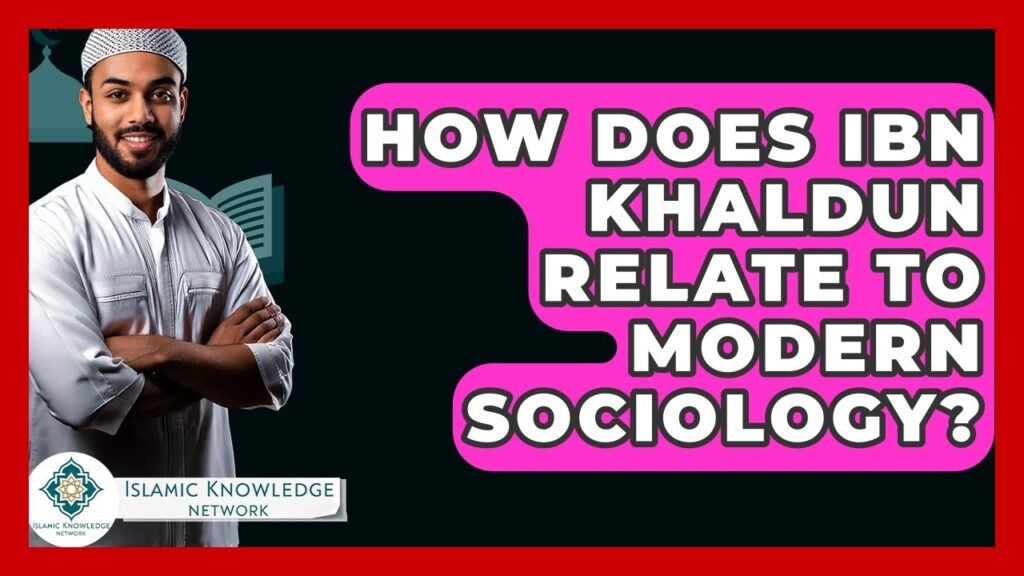You are here to read: How Does Ibn Khaldun Influence Modern Sociology Today? – A Thoughtfully Written Guide Offering Spiritual Wisdom and Travel Advice for Every Pilgrim who is going on holy journey of Hajj or Umrah.
How Does Ibn Khaldun Relate To Modern Sociology? – Islamic Knowledge Network
Ibn Khaldun, a 14th-century Arab historian and philosopher, is often regarded as one of the foundational figures in the field of sociology. His pioneering work, the Muqaddimah, laid the groundwork for understanding social dynamics, economics, and the interplay between culture and civilization. As we delve into the intricate connections between Ibn Khaldun’s theories and modern sociology, we unveil a timeless perspective that can enhance our comprehension of societal changes today.
At Airlink Hajj and Umrah, we recognize the importance of bridging the past with the present, particularly for those embarking on spiritual journeys. Just as Ibn Khaldun analyzed the social fabric of his time, we strive to keep our readers informed with the latest updates on Hajj and Umrah. Our blog serves as a rich resource, providing insights that not only reflect historical contexts but also inform contemporary practices. Join us as we explore how Ibn Khaldun’s profound insights can enlighten our understanding of modern societal issues, all while keeping you connected to your spiritual aspirations.
How Does Ibn Khaldun Influence Modern Sociology Today?
Ibn Khaldun, often regarded as the father of sociology, introduced concepts that remain relevant in modern social sciences. His seminal work, the Muqaddimah, laid the foundation for understanding social dynamics, group behavior, and economic influences on societies. By emphasizing the interplay between environment, culture, and socio-political structures, Ibn Khaldun’s insights resonate with contemporary sociological theories that examine how communities evolve over time.
One of his most significant contributions is the idea of Asabiyyah, or social cohesion, which highlights the importance of group solidarity in shaping societies. This concept remains vital as modern sociologists analyze how social groups maintain cohesion, particularly in multicultural environments. Furthermore, his analysis of the rise and fall of civilizations offers a lens through which we can study societal changes influenced by economics, politics, and culture—elements crucial to today’s sociological research.
At airlinkhajjandumrah.com, we integrate Ibn Khaldun’s principles into our discussions surrounding Hajj and Umrah, exploring how pilgrimage fosters social ties and community. Stay updated with all the latest on Hajj and Umrah on our blog, where we connect historical perspectives with contemporary practices, underscoring how these age-old traditions continue to shape our societies today.
You're at the middle of this awesome post at AirlinkHajjandUmrah.com through: How Does Ibn Khaldun Influence Modern Sociology Today?. Keep reading, it gets better!
FAQ on How Does Ibn Khaldun Influence Modern Sociology Today?
FAQs: How Does Ibn Khaldun Influence Modern Sociology Today?
1. Who was Ibn Khaldun and why is he significant in sociology?
Ibn Khaldun was a 14th-century Arab historian and philosopher whose work, particularly "The Muqaddimah," laid foundational principles for sociology and the study of human societies. His analytical approach to social dynamics, economy, and culture has greatly influenced modern sociological thought.
2. What key concepts introduced by Ibn Khaldun are relevant today?
Key concepts include the idea of ‘Asabiyyah’ (social cohesion), the cyclical nature of civilizations, and the role of economic and environmental factors in societal development. These ideas remain pertinent in contemporary discussions about group dynamics, social change, and the rise and fall of societies.
3. How did Ibn Khaldun approach the study of history and society?
Ibn Khaldun emphasized a critical and empirical method, advocating for the use of evidence and data in understanding societal trends. This empirical approach influences modern sociology’s reliance on qualitative and quantitative research methods.
4. In what ways can Ibn Khaldun’s theories be applied to current social issues?
Ibn Khaldun’s theories can be applied to analyze contemporary social issues such as urbanization, social conflict, and economic inequality. His insights on social cohesion and group identity can help understand today’s societal challenges amidst globalization and cultural shifts.
5. What impact did Ibn Khaldun have on other prominent sociologists or social theorists?
Ibn Khaldun’s work has influenced various sociologists, including Auguste Comte and Émile Durkheim, who built upon his ideas of social structure and cohesion. His legacy continues to resonate in the works of modern social theorists addressing the complexities of human interactions and societal development.
That wraps up How Does Ibn Khaldun Influence Modern Sociology Today?. Thanks for sticking with us till here! Share this: How Does Ibn Khaldun Influence Modern Sociology Today? with your friends.
Check our homepage at Air Link Hajj & Umrah for more awesome updates.
Some interesting posts are: 1: Umrah Mubarak, 2: When is Umrah closed 2026?, 3: When does Umrah start after Hajj 2026?
Mushu, an experienced Saudi Arabia traveler and writer, shares insightful tips and spiritual reflections to enhance Hajj and Umrah journeys for fellow pilgrims. He has been to Makkah and Madina from 2016 to 2023 many times and his posts will reflect this.







